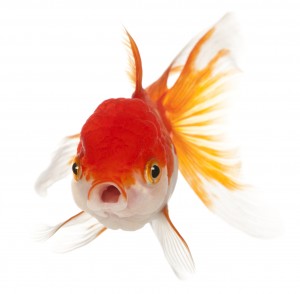Is my goldfish really happy?
Have you ever wondered what your pet is thinking? Well, thanks to research by prominent animal welfare expert Professor Ian Duncan, now you can. Professor Duncan claims he has devised a system that allows owners to ask their pets questions about how happy they are. Don’t expect your goldfish to recite Shakespeare or hold a frank discussion about their feelings but Professor Duncan suggests that animals are more sentient than people might think, can make decisions and reflect on their past and future.
In the past there was the view (and still is to some) that animals are dumb and only driven by programmed instincts for food, but vets, animal workers and pet owners know that there is a deeper connection pets have with people that i s based on more than just pre-programmed instincts. Just as our beloved family dog or cat is much more than just a pet, they have distinct personalities and unique ways of communicating with us. Take fish for example. Often portrayed as a bit dumb and forgetful (think Dori from ‘Finding Nemo’), many people overlook that they are creatures capable of feelings too. Professor Duncan’s studies have shown that fish feel fear and anticipate it in a similar way to other animals. Therefore if we can communicate more effectively with animals, this will improve their overall happiness and welfare, which would be a positive step forward.
s based on more than just pre-programmed instincts. Just as our beloved family dog or cat is much more than just a pet, they have distinct personalities and unique ways of communicating with us. Take fish for example. Often portrayed as a bit dumb and forgetful (think Dori from ‘Finding Nemo’), many people overlook that they are creatures capable of feelings too. Professor Duncan’s studies have shown that fish feel fear and anticipate it in a similar way to other animals. Therefore if we can communicate more effectively with animals, this will improve their overall happiness and welfare, which would be a positive step forward.
There is a recent report that Britain’s wild salmon population are becoming more stupid due to interbreeding with farmed salmon. Farmed salmon, bred for taste and size, have been so intensively inbred that they have lost some of the genetic traits that make them intelligent, including homing instincts and predator avoidance skills. This interbreeding could significantly jeopardise the future survival of Wild Atlantic Salmon. So we can’t just blame fish for being stupid, it’s most likely due to the way we have farmed them. Professor Duncan suggests it might be time to reassess the welfare of farmed fish and put it more in line with livestock, which can only be a good thing.
The president of the BVA recently spoke out against the practice of Halal slaughter in the UK citing it as a cause of ‘unnecessary suffering’ to animals, as they are still conscious and capable of feeling pain before they die. The research by Professor Duncan certainly puts this into context.
It will be interesting to hear more from Professor Duncan at the conference in Washington on Science and Emotion next week. Watch this space…


